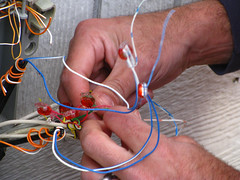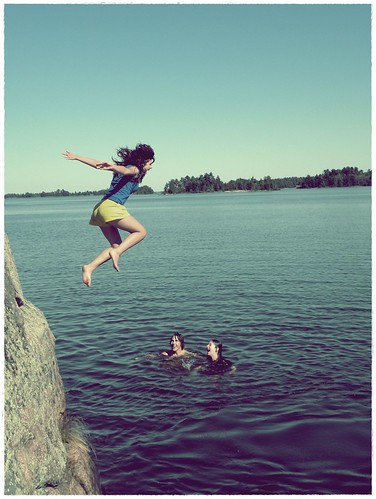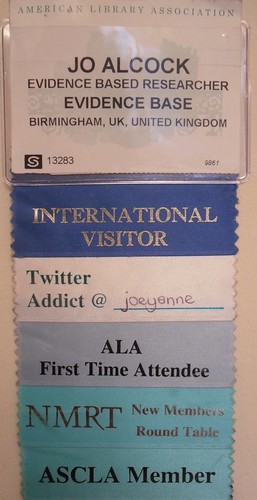I'm a strong believer in the value of professional organisations and I invest a lot of my time into them. I'm a member of
CILIP (Chartered Institute of Library and Information Professionals) in UK, and a member of
ALA (American Library Association). I also recently discovered that being a member of CILIP also means I'm an
IFLA (International Federation of Library Associations and Institutions), though I don't yet know much about this organisation (though I do follow the activities of their New Professionals group, NPSIG). I'd definitely like to learn more about IFLA; I think I'll be using my Twitter contacts (including IFLA staff) to discover more.
Both CILIP and ALA are member-led organisations, so they rely on members to support their development. They do both have staff, but any decisions essentially come from members (through committees, council and voting). So each member pays a membership fee, and in exchange for that they get lots of information though emails, magazines and journals, but the real value of the organisation is the membership and it does take a little bit of effort to make the most of that.
Our organisations can lead but they need us (their members) behind them
My involvement in CILIP
I volunteered to help out our local CILIP branch at an exhibition a couple of years ago, and when they were looking for committee members a couple of months later I decided to give it a go. I became Marketing Officer for
CILIP West Midlands, a position I have held since January 2010. Through this I have supported the local branch committee through meetings and emails; communicated with members (online and face to face - I manage our social media presence but also like to chat to members at events); and organised events for the branch. Highlights over the last year have been the
Library Debate we organised together with a local debating group, the
election hustings (where we livestreamed the event and took questions from the room and also from those watching the video), and the recent
Members Day where we heard about some innovative new library buildings being planned/built in the region. I've also set up some informal networking opportunities - we've started going to a local quiz night, which we won when we went for the first time earlier this month!
Photo from the CILIP West Midlands/Birmingham Salon Library Debate
Shortly after joining the branch committee, I was invited to join the
West Midlands division of the CILIP Career Development Group committee as branch liaison. I attend the group meetings, share information between the branch and the group (at meetings and via email), help to make relevant links between the groups and share resources when possible. The
Career Development Group (CDG) is interesting in that it has a number of regional divisions and also a national committee - this has some advantages but also presents challenges. On a related note, CILIP branches and groups are currently going through a period of transition so their structure and organisation may well change in future. One region is currently trialling a merge of the branch and their CDG division for example, something which I support in theory so I'll be interested to see how it develops.
My involvement in ALA
I decided to join American Library Association last year - they offer international membership for anyone outside the US. I'd been thinking about joining for a while as I was interested to learn more about the organisation and also get a wider perspective on the profession, so when a couple of friends recommended it as international members, I joined. I've been really impressed with the information I get from them and the different ways I can get involved. After attending the
ALA Annual Conference this year I was even more keen to get involved, so have put myself forward for a committee liaison position linking two of my membership groups: NMRT (New Member's Round Table) and ASCLA (Association of Specialized & Cooperative Library Agencies). I'll hopefully be starting that role soon and am really looking forward to being able to learn more about both groups and help facilitate communication between them.
My ALA conference badge with ribbons for membership groups
I've also applied for the ALA Emerging Leaders program which aims to introduce people to ALA and help them get involved in helping the organisation. It sounds like a really great program but I think there'll be a lot of competition so I'll have to wait to see what the result of that is. Even if I'm unsuccessful, I'd still like to get more involved with ALA if I can.
Committee work for me is one of the most rewarding professional activities I'm involved in, and I certainly hope to continue to support our professional organisations in this way. Now that I've finished my MSc dissertation (finally! - I've been studying since 2006), my focus is definitely going to be on supporting the development of professional organisations such as CILIP and ALA. If you're interested in getting involved (or wondering why you should), I'll be posting a further post later today explaining my thoughts on this.

 by glaukos
by glaukos 
 by dbking
by dbking 








